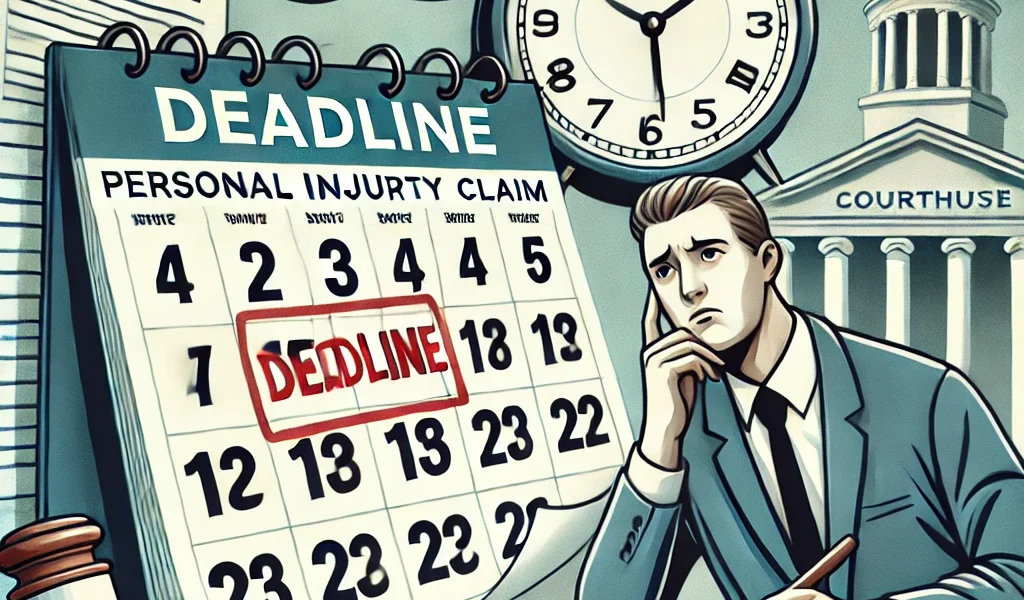Introduction
If you’ve been injured due to someone else’s negligence, you may be entitled to compensation. However, personal injury claims are bound by strict legal deadlines known as the statute of limitations. Failing to file your claim within the prescribed timeframe can result in losing your right to seek compensation.
In this article, we will explore how long you have to file a personal injury claim, factors that can influence the deadline, and what exceptions may apply.
Understanding the Statute of Limitations
The statute of limitations refers to the legally mandated time limit within which a personal injury claim must be filed. The purpose of this law is to ensure that cases are brought forward while evidence is still fresh and witnesses’ memories are reliable.
Each state has its own statute of limitations for personal injury cases, typically ranging between one to six years from the date of injury.
General Statute of Limitations for Personal Injury Claims by State
| State | Statute of Limitations |
|---|---|
| California | 2 years |
| Texas | 2 years |
| New York | 3 years |
| Florida | 4 years |
| Illinois | 2 years |
| Pennsylvania | 2 years |
| Ohio | 2 years |
| Georgia | 2 years |
| Arizona | 2 years |
| Washington | 3 years |
Note: It’s crucial to check your state’s specific laws or consult with an attorney to ensure you file within the deadline.
When Does the Statute of Limitations Begin?
In most cases, the clock starts on the date of the injury. However, certain circumstances may alter when the statute of limitations begins. Below are key scenarios:
1. Date of the Accident or Injury
- The statute of limitations generally starts on the day of the accident (e.g., car crash, slip and fall, workplace injury).
2. Discovery Rule (For Hidden or Delayed Injuries)
- In some cases, the injury or harm may not be immediately apparent. If an injury is discovered later, the statute of limitations may begin from the date of discovery rather than the actual accident date.
- Example: A patient discovers a surgical error months after the operation.
3. Minors and Legally Incapacitated Individuals
- If the injured party is a minor (under 18) or mentally incapacitated, the statute of limitations may be paused until they turn 18 or regain capacity.
4. Wrongful Death Claims
- If a personal injury leads to death, the statute of limitations for filing a wrongful death claim typically begins on the date of the person’s passing, rather than the date of the injury.
5. Claims Against Government Entities
- If your injury claim is against a government agency (e.g., public transportation accident, government employee negligence), you may face shorter deadlines, sometimes as little as six months.
What Happens If You Miss the Deadline?
If you fail to file your personal injury claim within the statute of limitations:
- Your case will likely be dismissed by the court.
- You lose the legal right to seek compensation from the at-fault party.
- Insurance companies may refuse to negotiate, knowing that you have no legal recourse.
There are very limited exceptions, so acting quickly is crucial if you want to protect your legal rights.
Exceptions to the Statute of Limitations
Certain exceptions may extend or modify the statute of limitations for filing a personal injury claim:
- Fraud or Misrepresentation – If the defendant intentionally hid their wrongdoing, the deadline may be extended.
- Military Service – If the plaintiff or defendant is on active military duty, the statute of limitations may be paused.
- Bankruptcy – If the at-fault party declares bankruptcy, claims against them may be delayed.
Steps to Take Before the Deadline Expires
To ensure you meet the filing deadline, follow these steps:
1. Seek Medical Attention
- Document all medical records and expenses related to your injury.
2. Gather Evidence
- Take photos, obtain accident reports, and collect witness statements.
3. Notify the Responsible Party
- Inform the at-fault party’s insurance company about your injury claim.
4. Consult a Personal Injury Lawyer
- An attorney can ensure you file within the legal timeframe and maximize your compensation.
5. File Your Claim Promptly
- Do not wait until the last moment; legal procedures take time, and delays can be costly.
Conclusion
Filing a personal injury claim within the statute of limitations is essential to securing compensation for your injuries. Each state has different deadlines, and certain exceptions may apply, depending on your situation.
If you are unsure about your deadline or need help filing your claim, consulting a personal injury attorney is always a wise decision. Taking action as soon as possible will increase your chances of a successful claim and ensure you don’t lose your right to compensation.
Disclaimer: This article is for informational purposes only and does not constitute legal advice. Consult a qualified attorney for legal guidance regarding your specific case.




